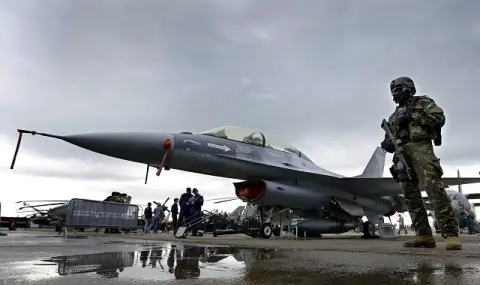Ukraine finally received F-16 fighter jets after more than a year of waiting. People familiar with the matter told Bloomberg on Wednesday that the first batch had arrived, Business Insider reported.
Officials later confirmed to The Associated Press that some F-16s were indeed in Ukraine.
Four NATO members - Belgium, Denmark, Norway and the Netherlands - had promised to send dozens of them. A source familiar with the matter told The Times of London that six F-16s had arrived from the Netherlands, with more to come from Denmark.
The jet will significantly upgrade Kiev's fleet of aging Soviet-era aircraft, improving its defense and offense and increasing its firepower.
However, they come with major limitations.
Ukraine has only a few aircraft and only a few pilots trained to operate them. Besides, Russia has its own planes and air defenses that can shoot them down.
That means Ukraine may not be using its F-16s for the frontline offensive it would prefer, according to military experts and Ukraine's top general.
Peter Leighton, a fellow at the Griffith Asia Institute who served in the Australian Air Force, said Ukraine should be cautious.
According to him, the small number of aircraft and few pilots means that Ukraine must prioritize avoiding losses in order to be able to fly the F-16 for as long as possible.
This, he told BI, means the F-16s will need to be "well protected” while on the ground and deployed primarily for operations "within“ Ukrainian airspace where it is safest.
"The main threat to them is Russian long-range air defense systems (S-400) and Russian fighter jets, which remain in Russian airspace but launch long-range air-to-air missiles into Ukrainian airspace,” he said.
Both dangers are most acute near Russian territory.
If Ukraine's F-16s get close to the front lines, they will have to stay "very" low altitudes to hide from Russian radar, says Justin Bronk, an expert on Russia and air warfare at the UK's Royal Joint Services Institute.
"Getting closer to the front lines more than 40 kilometers will carry a significantly increased risk,”, he notes. "I suspect that initially the pilots will stay while they continue to gain experience in the aircraft.
Colonel-General Oleksandr Sirsky, Ukraine's top general, spoke similarly to the Guardian last week, saying the F-16s would likely have to stay at least 40 kilometers from the front.
He pointed to the "superior aviation" of Russia and the "very strong" defense.
Ukraine also faces challenges when it comes to logistics around the F-16.
Marina Miron, a postdoctoral researcher at the Department of Military Studies at King's College London, says Ukraine needs to establish a network of radar stations, reinforced hangars, spare parts supply, refueling systems and quality airports.
"There are so many related issues that need to be addressed,”, she told the AP.
Ukraine may also lack properly trained soldiers.
A former Defense Department official told Politico in May that only 20 Ukrainian F-16 pilots — half of the 40 needed to fly a full squadron of 20 planes — were expected to graduate by the end of this year.< br />
And because pilots are needed for military service, Ukraine cannot afford to part with too many for long periods of training abroad, an unnamed defense official told The Washington Post last Sunday.
During an interview at the Reagan Institute last month, Ukrainian President Volodymyr Zelensky said there may be too few F-16s to matter on the battlefield.
"Even if we have 50, that's nothing. They have 300," he noted of the number of Russian fighter jets. He said it would take 128 F-16s to make a difference.
"The problem with the F-16 is the number and the dates,” he added.
The Ukrainian military has finally received the F-16 fighters, but will use them very carefully because of the Russian S
The jet will significantly improve Kiev's fleet of outdated Soviet-era aircraft, improving defense and offense and increased its firepower
Aug 2, 2024 19:19 547
